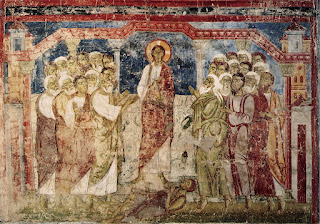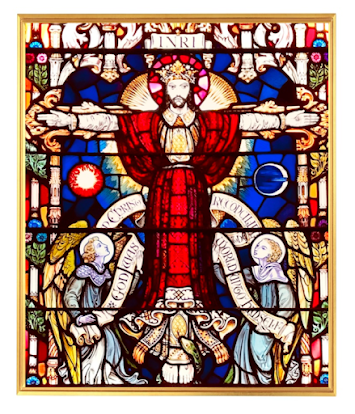Poetry in the Stocks
First about the Paul and Silas story. I love that it all started with this girl annoying them. They didn’t rebuke the spirit out of love for the slave but out of exasperation. She was driving them up the wall. The love of God can work with our exasperation, and so she was released from her bondage to the divination spirit. Of course, the enslavers were upset, and that landed Paul and Silas in jail, a place they were probably becoming familiar with by then.
One thing I find remarkable about in this story is that not just Paul and Silas but all the prisoners stayed put when the walls came down. The jailer assumed they would all leave. I mean, wouldn’t you? He was ready to commit hara-kiri on that assumption. What kept everyone in their cells? Surely they didn’t do it out of affection for their jailer. But something—I don’t know what—about the praying and hymn-singing had an effect on the place and the people. There must have been a lot of love going around there, to keep all those prisoners from fleeing into the night.
Wouldn’t it be great to know what they were singing? Musicologists have lost the tunes that people used in those times, more’s the pity. We do have bits of the lyrics like:
emptied himself,
taking the form of a slave,
assuming human likeness.
And being found in appearance as a human,
he humbled himself
and became obedient to the point of death—
even death on a cross.
There are several such poems quoted in the letters of Paul. I really want to know what they were singing in that jail. It’s a pity the author we call Luke didn’t record that. Words and music can be powerful forces for bringing people together and keeping them that way. Sometimes, as in this case, they can even keep someone alive AND save his soul.
We also don’t know exactly who penned the Johannine pieces in the New Testament, but whoever it was had a tendency to wax poetic that I find endearing. Setting aside for the moment the obvious beef the Gospel writer had with the Jewish authorities, much of the Gospel of John is literary gold. The opening, for instance—“In the beginning was the Word, and the Word was with God, and the Word was God…” You know that bit. Today we get another John poem in the form of a prayer by Jesus.
I ask not only on behalf of these,but also on behalf of those who willbelieve in me through their word,that they may all be one.As you, Father, are in me and I am in you,may they also be in us…The glory that you have given me I have given them,so that they may be one, as we are one,I in themand you in me.
The Spirit and the bride say, "Come."
And let everyone who hears say, "Come."
And let everyone who is thirsty come.
Let anyone who wishes take the water of life as a gift.
Not far from this community of St. Andrew’s, there’s an equally tight-knit and loyal community of poets called Slam Free or Die. We meet at a pub in the Millyard on Thursdays. We meet to share words, to support each other, to form solidarity when the world turns against our members. Like the people of St. Andrew’s, we poets have each others’ backs.
Many of the poets there are in the LGBTQ community. My advocacy for the trans and the gay and the other queer children of God arises not just from my personal ethics but from knowing so many of them personally and hearing their eloquent, desperate voices.
Let anyone who is thirsty take the water of life. Anyone.
Of course, the poem-prayer of Jesus in the Gospel today is poignant, especially from the perspective of 2000 years later. We are not all one as he had prayed we would be. There are deep divisions among those who call on his name. He was building a community of humans, and human foibles and egos and downright vices have divided us to the point that we often see one another as not just opponents but as enemies. From early days, the community was divided by ideology into heresy and orthodoxy, then into Orthodox and Catholic, then into Catholic and Protestant, then into many varieties of Protestant, all of these claiming to be the one true Church, and all coming short of what Jesus had in mind. We have burned each other at the stake over these disagreements.
When I was in England with the Wheaton College English department, we had one professor who was an Episcopal priest who pointed out every crossroads where Catholics were burned by Puritans, and a strict Calvinist professor who showed us where Puritans were burned by Catholics. Their theological rivalry was mostly merry, but it still had an edge. I was a protégé of the first professor, and therefore was not well-respected by the second one. We remain “By schisms rent asunder,” and “by heresies distressed.”
But at some point that we can’t yet see, Jesus’ prayer will be answered. I believe, for instance, that my late fundamentalist Aunt Wilma will find herself in heaven with my late queer friend Steve (who knelt before an oncoming train because he couldn’t live anymore under Evangelical rules), and they will both be surprised to see each other there, and then they will embrace. I totally believe this. When is not important. Linear time is not important. It will happen, or is happening, or has happened, and I put both names in my remembrance for All Saints’ Day.
The heresy of Christian Nationalism is plaguing us at this historical moment. It arises from the fundamentalism of my dear, muddled aunt and has merged with bald-faced bigotry and false patriotism and daft conspiracy theories to form a theological monster. It is causing no end of trouble in the present, but I must believe that it will eventually go the way of Gnosticism and Arianism and all the other isms that fell by the wayside in the course of us figuring things out.
The throughline of the Gospel will prevail. The love, the surprising, unexpected, exasperated love that crushes prison walls, that saves desperate jailers, that liberates the exploited, will prevail. Jesus is the Alpha and the Omega. Nothing will, in the end, fall outside that love. Paul and Silas and the jailer and the prisoners and the fortune-teller and the disciples and Wilma and Steve and all of us, all of us, are inside the love of Jesus. And somehow, unlikely as it seems now, we all will be one.



Comments
Post a Comment